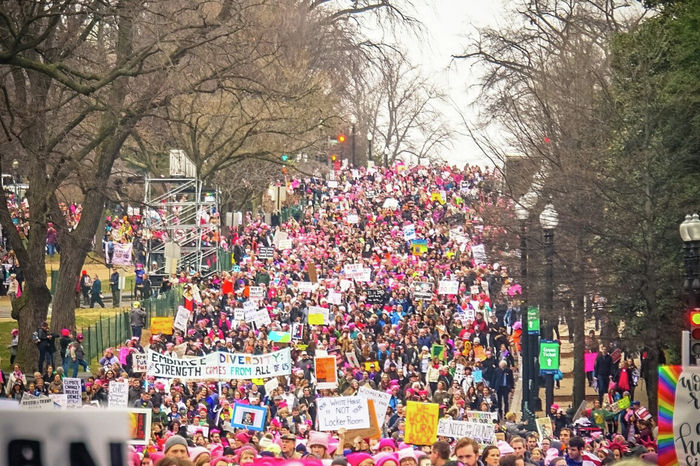Trump’s second election hits Americans harder than his first
Zoë Randolph wonders how to think about her native America now that her fellow voters have returned Trump to the White House

I didn’t stay up to watch the election results this year. I put myself to bed just after the polls closed on the east coast. I knew from 2020 that to expect a speedy result was foolish. Pollsters’ numbers (which I’d been consuming like an addict for months) had been so consistent that they had taken on the feeling of a mantra: statistically tied; statistically tied; in every battleground state, they are statistically tied.
The very idea that a supremely qualified woman representing an administration with a resume of impactful achievements, legislative and otherwise, could be tied with a man who spent his time watching wrestling matches and speculating about whether you should swim toward a shark or a sinking electric boat was crazy-making, of course. But by the time I woke up on November 6, the tie I’d so derided looked like a foolish dream. It wasn’t too close to call, after all—not by a mile.
“By the time I woke up, the tie I’d so derided looked like a foolish dream”
I’m what this university tenderly terms a “mature” student, which in my case means I had just finished undergrad back in 2016. On election night that year, I sat in front of the television in my first adult flat feeling shock punch down on me like a giant fist. The champagne I had picked up on the way home to celebrate the first woman president sat forgotten in the fridge. I had started the day believing one thing about America, and I ended it believing something very, very different.
I didn’t buy champagne this time. No one I knew was stupid enough to feel the confidence of eight years ago. But we held firmly to the talismans of hope we learned to polish the last time around. During the first Trump era, those of us whom the right would sneeringly dub “coastal elites” found ways to salvage our belief in America. Don’t get me wrong: I’ve never been rosy about my home country. I jumped at the chance to get a degree abroad. But despite being violent, racist, misogynistic, bullying, and just about every other unsavory adjective, America could still be a story of messy, frustrating, incomplete democratic progress if you squinted at it just right.
Central to that story was the popular vote. Trump had not won it—no Republican had since 2004. This fact gave me tacit permission to see the problems of my country as primarily structural. The electoral college was a joke. If everyone’s vote counted equally, we wouldn’t be in this mess.
From 2016 to 2020, this kept my hope alive. “Three million more people voted for Hillary Clinton,” I’d remind anyone who tried to make a sweeping statement about “Trump’s America.” Yes, he’d taken it, I told myself, but he certainly hadn’t earned it.
“My fellow 2024 voters knew what the former president was”
This round is different. This time, the man who presided over an armed insurrection and spent the next four years promising to dismantle America’s democratic systems didn’t just keep support: he gained it. He didn’t have to unleash swarms of lawyers after election day to disenfranchise voters. He didn’t have to incite the rioting of a violent mob on the Capitol. He didn’t even have to fall back on the damned electoral college. No matter how you slice it, he won fair and square.
My fellow 2024 voters didn’t have to spend their free time listening to academics on podcasts expounding upon Trump’s fascist tendencies to know what they were voting for. They knew what the former president was: liar, felon, bully. They knew he had no respect for law or institutions. They knew his priority was retribution. They knew this—and they liked it. More Americans cast their ballots for the anti-democracy candidate than the pro-democracy candidate. What does one do with that?
Trump’s coalition is not a monolith. But this year’s results are a reminder that sometimes people fight and die for democracy, while other times they peacefully give it away—so long, of course, as they believe the autocrat is on their side.
 Comment / Plastic pubs: the problem with Cambridge alehouses 5 January 2026
Comment / Plastic pubs: the problem with Cambridge alehouses 5 January 2026 News / Cambridge businesses concerned infrastructure delays will hurt growth5 January 2026
News / Cambridge businesses concerned infrastructure delays will hurt growth5 January 2026 News / New movement ‘Cambridge is Chopped’ launched to fight against hate crime7 January 2026
News / New movement ‘Cambridge is Chopped’ launched to fight against hate crime7 January 2026 News / Uni-linked firms rank among Cambridgeshire’s largest7 January 2026
News / Uni-linked firms rank among Cambridgeshire’s largest7 January 2026 News / AstraZeneca sues for £32 million over faulty construction at Cambridge Campus31 December 2025
News / AstraZeneca sues for £32 million over faulty construction at Cambridge Campus31 December 2025









